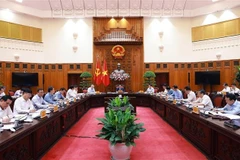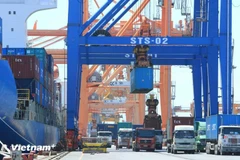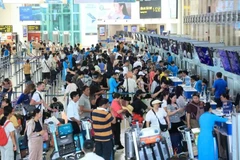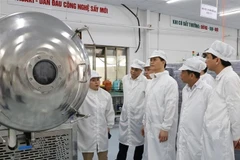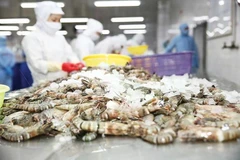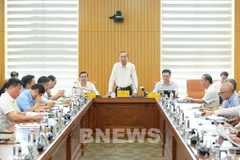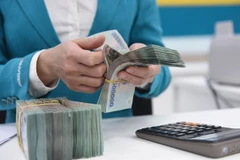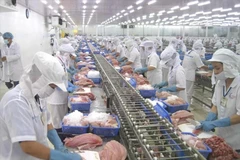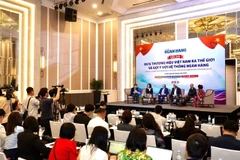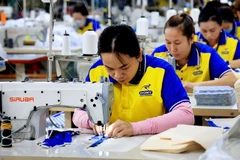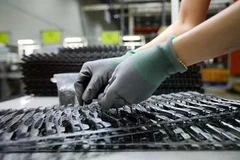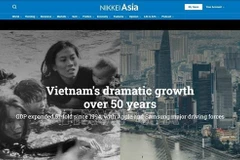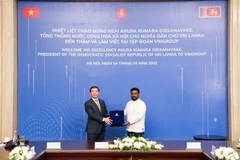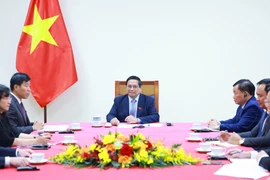The country has committed to ensuring afavourable, stable and safe environment for foreign investors as theyplay a key role in the country's import and export activities, Tran TuanAnh, Deputy Minister of Industry and Trade, said at a meeting held inHo Chi Minh City on July 25.
Last year, exports reached 132billion USD, up 15.4 percent over 2012, of which FDI businessesaccounted for 67 percent of the country's total export value, Anh said.
Leading export items from FDI firms included mobile phones, computers, textiles, footwear, machinery and spare parts.
Exportsreached 70.88 billion USD in the first half of this year, of which FDIfirms accounted for 67.5 percent of the country's total export value.
To date, there are 16,589 FDI projects in Vietnam with a total registered capital of 239.7 billion USD.
The Republic of Korea (RoK) topped the list in terms of number of projects (3,827 projects), followed by Japan and Taiwan.
Meanwhile,Japan topped the list in terms of capital with 35.7 billion USD,followed by Singapore and the RoK, according to the Ministry of Industryand Trade.
Anh said FDI businesses have contributed to thebalance of trade, which helped the country achieve a trade surplus,stabilise foreign exchange and increase foreign currency reserve.
FDI firms achieved a trade surplus of 6.48 billion USD last year, up from 4.1 billion USD in 2012.
Speakingat the event, Tran Thanh Hai, deputy chief of the ministry’sImport-Export Department, said that FDI firms' export growth has been 30percent year-on-year.
Foreign companies have helped to establish export-producing hubs that have adapted to each region's feature, Hai added.
Forexample, FDI businesses specialise in making mobile phones andelectronics in Bac Ninh and Thai Nguyen provinces and Hai Phong.
Theymake automobiles and motorbikes in Vinh Phuc Province. And they makeelectric wires and cables in Dong Nai, Binh Duong and Long An provinces.
FDI businesses have created more jobs, thus enhancing human resource quality and labour re-structuring.
FDIinvestment has had a positive impact on accelerating industrialisationand modernisation and integration in the global economy. It has alsohelped create significant capital for the economy.
Somehigh-quality services have been created such as telecommunications,international tourism, finance and banking, insurance, audit, shippingand logistics.
Meanwhile, there has been a rapid increase in FDIfirms' import turnover: from 43.5 percent in 2010 to 56.71 percent lastyear, said the ministry.
FDI businesses have not yet produced agreat deal of high-value added and intensive products in Vietnam. Theyalso depend heavily on imported materials.
For example, mobilephones, electronics and automobiles are mainly assembled from importedspare parts; and apparel and footwear are just CMT (cut-make-trim) fromimported materials.
FDI firms have not actually focused ontechnology transfer as committed. Also they have not contributed tosupport industries in Vietnam, and they have not developed largeprojects on agriculture or projects in mountainous areas.
Besideschallenges and solutions, the conference also discussed the outlook forFDI activities, implementation of the export-manufacturing plan, andchallenges in policies related to finance and taxes, exports andimports, and customs procedures.
The event also discussed detailed recommendations on how to increase production and export of FDI firms.
Speakers said the country should focus on producing high-value exports with high value added.
Itwas also recommended to invest in production chains of materials,including fabric making, weaving and dying, footwear materials,high-class plastic materials, electronic components, and motorbikeengines.
Speakers also recommended that Vietnam enhance its valuesupply chain with companies in support industries. In addition, thecountry should continue to transfer technology and improve the localvalue content of Vietnamese products.
Investment in large-scale agricultural projects and food processing industry in rural and mountainous areas was also suggested.
There are 101 countries and territories with investment projects in Vietnam.-VNA

